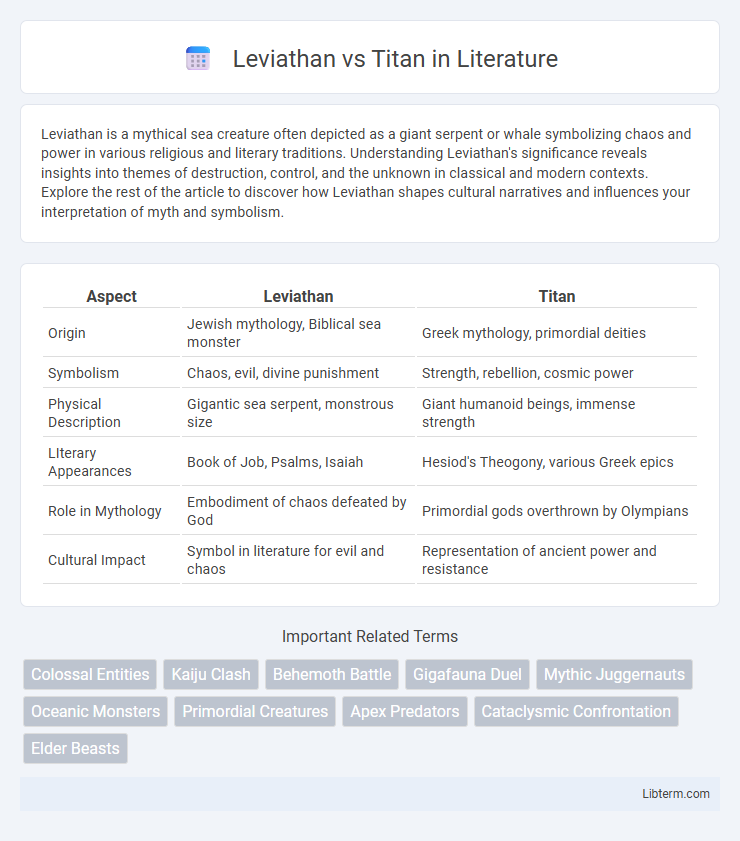Leviathan is a mythical sea creature often depicted as a giant serpent or whale symbolizing chaos and power in various religious and literary traditions. Understanding Leviathan's significance reveals insights into themes of destruction, control, and the unknown in classical and modern contexts. Explore the rest of the article to discover how Leviathan shapes cultural narratives and influences your interpretation of myth and symbolism.
Table of Comparison
| Aspect | Leviathan | Titan |
|---|---|---|
| Origin | Jewish mythology, Biblical sea monster | Greek mythology, primordial deities |
| Symbolism | Chaos, evil, divine punishment | Strength, rebellion, cosmic power |
| Physical Description | Gigantic sea serpent, monstrous size | Giant humanoid beings, immense strength |
| LIterary Appearances | Book of Job, Psalms, Isaiah | Hesiod's Theogony, various Greek epics |
| Role in Mythology | Embodiment of chaos defeated by God | Primordial gods overthrown by Olympians |
| Cultural Impact | Symbol in literature for evil and chaos | Representation of ancient power and resistance |
Introduction to Leviathan and Titan
Leviathan, a colossal sea creature rooted in biblical and mythological texts, symbolizes overwhelming power and chaos in the depths of the ocean. Titan, derived from Greek mythology, represents a race of giants known for their immense strength and primordial rule before the Olympian gods. Both entities embody immense scale and formidable might but differ in their mythological origins and symbolic meanings.
Origins and Mythological Backgrounds
Leviathan originates from ancient Hebrew mythology, described in the Bible as a massive sea serpent symbolizing chaos and primordial power, often associated with the god of the sea or the forces of nature. Titan derives from Greek mythology, representing the elder gods who ruled before the Olympians, embodying immense strength and cosmic influence as descendants of Uranus and Gaia. Both entities serve as foundational mythological figures representing overwhelming power and chaos in their respective cultural narratives.
Physical Descriptions and Unique Features
Leviathan is described as a massive sea serpent with impenetrable scales, a serpentine body often covered in rigid armored plates, and multiple rows of razor-sharp teeth, emphasizing its aquatic nature and immense strength. Titan, by contrast, is a colossal humanoid figure with towering height, immense physical power, and skin resembling stone or metal, often depicted with glowing eyes that signify immense energy or elemental control. The Leviathan's unique features include its mastery of the ocean depths and ability to generate powerful whirlpools, while the Titan boasts unparalleled endurance and control over earth and fire elements, making each creature distinct in both physical form and elemental mastery.
Strengths and Abilities Compared
Leviathan exhibits immense aquatic strength, possessing unmatched control over water currents and formidable durability in deep-sea environments, making it a dominant force underwater. Titan boasts colossal physical power, advanced combat capabilities, and resilience on land, with enhanced endurance and an ability to manipulate the environment for strategic advantage. Both entities demonstrate extraordinary size and strength, but Leviathan excels in aquatic mastery while Titan dominates terrestrial combat scenarios.
Symbolism and Cultural Significance
Leviathan symbolizes chaos and primordial sea power in Judeo-Christian mythology, often representing the unstoppable force of nature and divine judgment. Titan, rooted in Greek mythology, embodies immense strength, rebellion, and the ancestral lineage of gods, symbolizing cosmic order and primal power. Both creatures reflect humanity's struggle to understand and personify natural and supernatural forces through mythic narratives.
Leviathan in Literature and Media
The Leviathan is a colossal sea monster originating from biblical texts, often depicted in literature and media as a symbol of chaos and power. Literary works like Thomas Hobbes' *Leviathan* use the creature metaphorically to represent the overarching authority of the state, while in fantasy genres, the Leviathan appears as a formidable aquatic antagonist embodying primal forces of nature. Its portrayal contrasts with the Titan, which is generally associated with Greek mythology and represents giant deities, emphasizing the Leviathan's unique cultural symbolism as a primal leviathan of the deep.
Titan Representations in Popular Culture
Titan representations in popular culture often depict colossal beings embodying immense power and primordial strength, prominently featured in mythologies, video games, and films. These Titans symbolize ancient forces and cataclysmic events, with iconic portrayals such as the Titans in "Attack on Titan," where giant humanoids threaten humanity, and the mythological Titans in movies like "Clash of the Titans," showcasing epic battles between gods and Titans. The recurring theme highlights Titans as embodiments of chaos and raw elemental energy, contrasting with the Leviathan's association with the sea and darkness.
Famous Battles and Encounters
Leviathan and Titan have clashed in legendary battles recorded across various mythologies and modern fantasy lore, often symbolizing the struggle between sea and land forces. Famous encounters include the titanic fight in the Norse mythology where the Leviathan, as a giant sea serpent, battles Thor's Titan adversaries amid thunderstorms and oceanic upheaval. Modern portrayals in video games and literature depict their confrontations as cataclysmic events, shaping the fate of worlds through raw power and elemental fury.
Legacy and Modern Interpretations
Leviathan symbolizes chaos and divine power in Judeo-Christian mythology, influencing literature and modern media as a representation of uncontrollable force and deep-sea terror. Titans, originating from Greek mythology, embody primordial strength and rebellion, shaping contemporary interpretations of giant adversaries in fantasy genres. Both entities highlight humanity's fascination with ancient, colossal beings, reflecting evolving cultural values and psychological archetypes in modern storytelling.
Conclusion: Leviathan vs Titan – Who Reigns Supreme?
Leviathan's immense size and mythological symbolism position it as the ultimate sea creature, dominating oceanic lore with unmatched ferocity. Titan's power, often associated with colossal strength and influence in Greek mythology, emphasizes terrestrial dominance but lacks the aquatic supremacy of Leviathan. Hence, in the battle of Leviathan vs Titan, Leviathan reigns supreme due to its unparalleled maritime dominance and enduring cultural impact.
Leviathan Infographic

 libterm.com
libterm.com